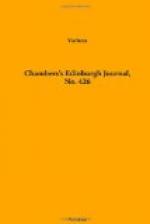Thus was legalised the Reign of Terror, which, founded in false reasoning and insane fears, we must, nevertheless, look back upon as a thing, at least to a certain extent, reconcilable with a sense of duty; inasmuch as even while signing warrants for transferring hundreds of people to the Revolutionary Tribunal—which was equivalent to sending them to the scaffold—Robespierre imagined that he was acting throughout under a clear, an imperious necessity: only ridding society of the elements that disturbed its purity and tranquillity. Stupendous hallucination! And did this fanatic really feel no pang of conscience? That will afterwards engage our consideration. Frequently, he was called on to proscribe and execute his most intimate friends; but it does not appear that any personal consideration ever stayed his proceedings. First, he swept away Royalists and aristocrats; next, he sacrificed the Girondists; last, he came to his companion-Jacobins. Accusing Danton and his friends of a tendency to moderation, he had the dexterity to get them proscribed and beheaded. When Danton was seized, he could hardly credit his senses: he who had long felt himself sure of being one day dictator by public acclamation, and to have been deceived by that dreamer, Robespierre, was most humiliating. But Robespierre would not dare to put him to death! Grave miscalculation! He was immolated like the rest; the crowd looking on with indifference. Along with him perished Camille Desmoulins, a young man of letters, and a Jacobin, but convicted of advocating clemency. Robespierre was one of Camille’s private and most valued friends; he had been his instructor in politics, and had become one of the trustees under his marriage-settlement. Robespierre visited at the house of his protege; chatted with the young and handsome Madame Desmoulins at her parties; and frequently dandled the little Horace Desmoulins




